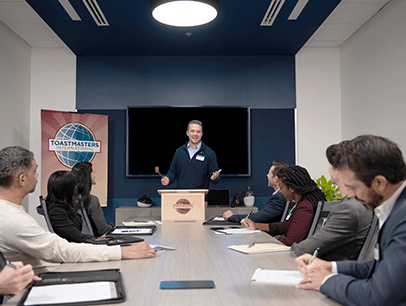
The Vice President Education (VPE) holds the critical responsibility for ensuring club members get the most from their Toastmasters education journey. At the same time, it’s a hands-on opportunity for this officer to build their own leadership and organizational skills.
What Makes a Great VPE?
I believe the most successful VPEs share three traits: a desire to help others succeed, attention to detail, and a real passion for Toastmasters.
VPEs develop an excellent understanding of Pathways and use this knowledge to guide fellow club members toward goals and achievements. Jonathan Silverberg, DTM, VPE of Village Toastmasters Club in Edenvale, South Africa, says, “As VPE, I really get to know all our club members.” Knowing what members want to achieve, paired with his Pathways expertise, allows Silverberg to guide them effectively. The support “helps members maintain their enthusiasm, and has helped me improve my own leadership and communication skills,” he notes.
Here’s a look at the VPE’s key responsibilities.
Agendas and Meeting Roles
Overseeing the agenda and helping fill meeting roles are two of the VPE’s most important responsibilities, because quality clubs thrive on robust programs and members who enthusiastically take meeting roles. So the VPE works hand in hand with the Toastmaster of the Day for each meeting to ensure the agenda is completed ahead of time and all meeting roles are filled.
There are a variety of ways to manage role assignments. Some clubs simply ask for volunteers at the end of each meeting for the next one (with the VPE following up with requests and reminders before the next meeting). While this may be the easiest option, it may also be the least effective. Experience shows you usually only get a few volunteers, which can create a negative atmosphere in the club.
One suggestion is for the VPE to use a simple Excel spreadsheet to track assigned roles well in advance of the meeting. Clubs can maintain this information on the member section of their website or the Toastmasters easy-Speak platform.
As the VPE, you will help fellow Toastmasters thrive, and feel a tremendous sense of accomplishment yourself.
When I was VPE of Rose City Toastmasters, in Welland, Ontario, Canada, we published a roster of filled roles for the next month and emailed it with the current agenda to all members. Since we met weekly, this gave everyone a month to prepare for their role. At the end of each meeting, we reviewed the upcoming roster and made any adjustments right then. While somewhat time-consuming for the VPE, we found it led to far greater member participation.
Another helpful tip regarding meetings: Explain the club’s expectations for meeting participation to each new member. Couple this with gentle reminders to all members throughout the year and you will find much greater participation. Encourage more experienced members (and the Club Executive Committee) to set an example by regularly signing up for roles and speeches. At the same time, make sure the same people are not taking roles each meeting; urge those who rarely take roles to give it a try and not be intimidated.
Base Camp Manager
In most clubs, the VPE is the Base Camp manager. In this role, your primary duties are to verify Pathways speech and level completions, track member progress, and ensure education award applications are submitted in Club Central once they have been approved in Base Camp. The VPE accepts a significant responsibility for helping members progress through Pathways.
Resources and Recognition
As the VPE, try the Pathways Achievement Tracker, a handy visual tool to track member progress and inspire everyone who can see their accomplishments on the chart.
The VPE collaborates with the Club President to celebrate and acknowledge member successes. Set aside some time each meeting to publicly recognize achievements, from the first Ice Breaker to finishing a Pathways level. And don’t limit yourself to strictly Toastmasters achievements. Celebrate job promotions or member speaking events outside the club. If appropriate, work with the Vice President Public Relations to post news of broad interest on social media. Remember, recognition builds self-esteem and self-confidence and inspires other members to strive for achievement as well!
Mentor Manager
The VPE manages a robust mentor program, which is vital to every club’s success. New Toastmasters often feel overwhelmed at first and may doubt themselves as they see the more experienced members give speeches and execute meeting roles. As VPE, you ensure that all new members are paired with a mentor and that more experienced members can be connected with a mentor when needed.
A good starting point is to meet with every new member as soon as possible and discover what they want to achieve by joining Toastmasters and why. This gives you a sense of the person’s goals, interests, and personality, so you can pair them with a mentor who will be a good fit.
Other Responsibilities
The VPE, along with the Club President and the Vice President Membership, represent the club at Area and District Council meetings.
The VPE is also responsible for managing club speech contests and assisting, as needed, with the Area speech contest(s). VPEs don’t actually run the contests; instead, they draw a talented team together to do this. How involved you are as the VPE depends on your specific club, although at a minimum you should recruit the Club Contest Chair and Chief Judge.
Contests do present VPEs with another special role—the opportunity to motivate members to enter contests or take contest roles. Stretching ourselves is how we grow, and participating in speech contests in an excellent way for members to break out of their comfort zones.
Self-Guidance
It’s important not to neglect your own development; make sure you move forward on your own Pathways journey. It is easy to focus on other members and ensure they succeed while neglecting yourself. Just as you track the progress of others, be sure to track your own.
Aspire to Be a VPE?
Now that you have a better understanding of this role, what should you do if you’re thinking about taking this position in the future? Iwona Lider, President of The Gavellers Toastmaster Club in Melbourne, Victoria, Australia, and a former VPE, suggests shadowing the current VPE before taking on the role. “And don’t be afraid to suggest changes to improve the process. That can be the most interesting part of the role,” Lider says.
The VPE role promises an exciting, challenging, and rewarding experience. You will help your fellow Toastmasters thrive, and feel a tremendous sense of accomplishment yourself as a leader, organizer, and Pathways expert.
Greg Lewis, DTM is a retired business professional who strives to inspire and encourage his fellow Toastmasters. He and his family live in Fonthill, Ontario, Canada.
Related Articles

Club Officers
The Master of Promotion

Club Officers
Club President: The Team Leader

Club Officers



 Previous
Previous

 Previous Article
Previous Article